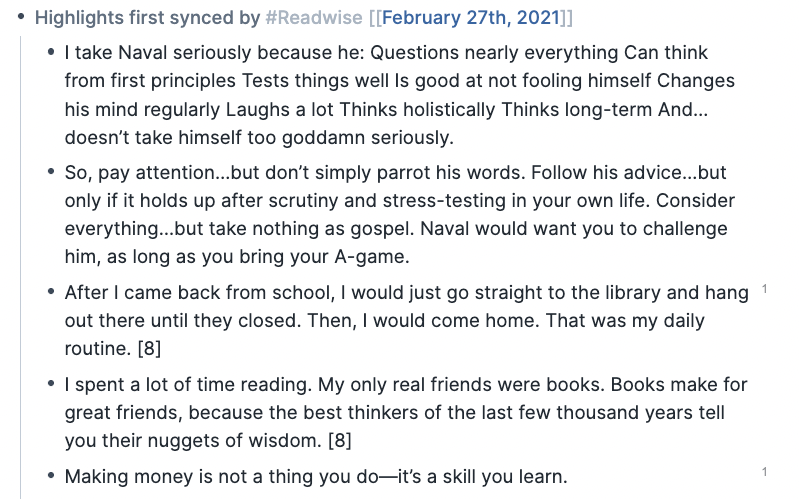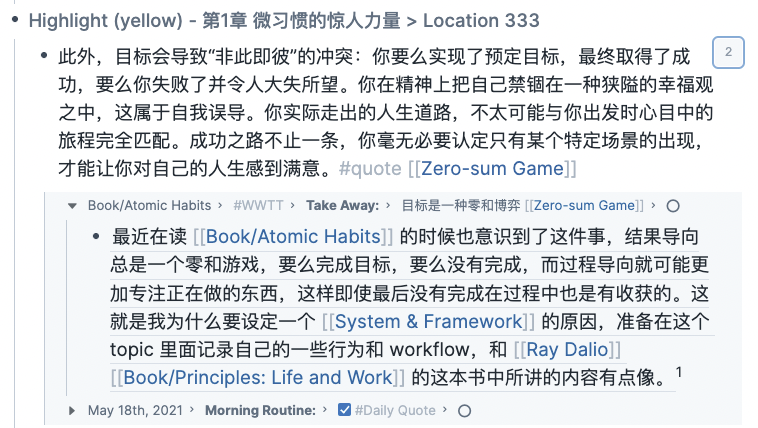Naval Ravikant 的 9 个阅读原则
Hello,大家周日好,这是 Jiayuan Thoughts 的第 3 期,感谢 134 位新读者订阅支持。
今天发现 The Almanack of Naval Ravikant 的中文版《纳瓦尔宝典》已经在 Kindle 上架了。去年年初时在 Amazon 的每日推荐中看到这本书,毫不犹豫地买下,几乎是一口气读完,并摘录了大量的笔记到 Roam 中,今年年初的时候又重读了一遍,依然收获很多。等到微信读书上架中文版后,打算再重读一遍,就像 Naval 所说的,优秀的内容值得一读再读。

Naval Ravikant 是何许人也?他是硅谷硅谷著名的风险投资家和创业者,曾经投资了 Uber、Twitter、Stack Overflow 等公司,并且是 AngelList 的创始人。他的履历异常丰富。
- 1999 年,25 岁创办 Epinions
- 2001 年,27 岁成为 August Capital 的风险投资合伙人
- 2003 年,29 岁创办 Vast.com
- 2007 年,32 岁创办 Hit Forge 投资基金
- 2010 年,34 岁创办 AngelList 并投资了 Uber
2020 年初,听 Farnam Street 的一期播客(The Knowledge Project),从而了解到了 Naval Ravikant,当时还专门写了一篇博客来推荐。

翻阅 Roam Research 中记录的和 Naval 有关的笔记时,发现了大量关于他对于阅读的观点和看法,Naval 把购买书籍当成一种投资而不是消费,并把阅读书籍作为主要的信息获取方式。他的这些方法和观点同时也很大程度地影响到我的阅读方法,比如,在 2021 年,我几乎不阅读 RSS 和稍后读中保存的文章,而以阅读书籍为主要的信息获取来源(https://twitter.com/Tisoga/status/1476509142135181312)。
今天这期 Newsletter,我想分享一下我从 Naval 那里学到的关于阅读的 9 条原则。
1. 读书不应该追求数量
These days, I find myself rereading as much (or more) as I do reading. A tweet from @illacertus said, “I don’t want to read everything. I just want to read the 100 great books over and over again.” I think there’s a lot to that idea. It’s really more about identifying the great books for you because different books speak to different people. Then, you can really absorb those.
Naval认为读书不应该追求数量,而是选择100本书然后反复阅读。比如他曾在一期播客中提到,最近在研读多伊奇的两本书:《无穷的开始》和《真实世界的脉络》,并且购买了这两本书所有的版本,以便于能够在任何情况下都能读到(电子书、纸质书)。
2. 阅读经过时间检验的书籍
Any book that survived for two thousand years has been filtered through many people. The general principles are more likely to be correct. I wanted to get back into reading these sorts of books.
经历过的时间越长,书中的观点就被检验地越多,应该阅读那些经过时间洗礼的书。例如 Marcus Aurelius 的 Meditation,Stoic 的哲学即使放到现在也不过时。
3. 补充第二点,不能矫枉过正,有些时候可能现代的书更加适合,例如如何驾驶飞机,关键是要看这个问题是什么时候提出来的
If you’re trying to learn how to drive a car or fly a plane, you should read something written in the modern age because this problem was created in the modern age and the solution is great in the modern age.
4. 阅读不是赛跑,你应该慢读一本好书
Reading a book isn’t a race—the better the book, the more slowly it should be absorbed.
The reality is, I don’t actually read much compared to what people think. I probably read one to two hours a day. That puts me in the top .00001 percent. I think that alone accounts for any material success I’ve had in my life and any intelligence I might have.
Ryan Holiday 在一期视频(Ryan Holiday’s 3-Step System for Reading Like a Pro)中也提过类似的观点:Speed Reading is Bullshit。
Ryan 提到他从来不速度,即使按照正常速度来阅读,一周也能读完一本 1000 页的大部头。
Slow reading 有时候是一种和阅读内容增加“摩擦”的方式,知识的输入越困难,提取就越容易。
5. 挑选很多书,但是只读其中的一部分
I don’t actually read a lot of books. I pick up a lot of books and only get through a few which form the foundation of my knowledge.
按照第 1 条原则,你需要对阅读的内容进行筛选,然后挑出其中重要的部分来阅读。
6. 一次阅读多本书
Naval 一次会阅读 10 - 20 本书。
I open up my kindle, I look through. Based on my mood, I’ll flip through to whatever book matches my mood…The most important thing that does for me is it lets me read on a regular basis.
If the book is getting a little boring, I’ll skip ahead. Sometimes I’ll start reading a book in the middle because some paragraph caught my eye and I’ll just continue from there, and I feel no obligation whatsoever to finish the book.
这个观点我实践下来发现 10 - 20 本书可能会有点多,但是同时阅读 3 - 5 本书会是一个比较好的选择,比如我会同时阅读一本专业类的书 + 一本 non-fiction + 一本传记或者文学类作品。
7. 没有必要阅读整本书
你不需要读完整本书才算是「读完」,1)不是所有的书都值得从头到尾读完;2)如果读不下去,没关系,先放下去读别的书,等过一段时间再回来读。
Generally, I’ll skim. I’ll fast forward. I’ll try and find a part to catch my attention. Most books have one point to make. (Obviously, this is nonfiction. I’m not talking about fiction.) They have one point to make, they make it, and then they give you example after example after example after example, and they apply it to explain everything in the world. Once I feel like I’ve gotten the gist, I feel very comfortable putting the book down. There’s a lot of these, what I would call pseudoscience bestsellers…People are like, “Oh, did you read this book?” I always say yes, but the reality is I read maybe two chapters of it. I got the gist.
通常,一本 non fiction 的作者会不断地使用例子来说明书中提到的观点,一旦你理解了作者想要表达的意思,可以直接跳过这部分。
The number of books completed is a vanity metric. As you know more, you leave more books unfinished. Focus on new concepts with predictive power.
「完成阅读」的数量并不重要,实际上,如果你知道的阅读,就会 unfinish 更多的书,因为其中的大部分内容你都知道了,不需要再次重复阅读。
Sometimes the book isn’t bad — you just never feel like reading it. The prevailing wisdom is to power through, but that is terrible advice.
You’re not in school anymore — reading should be a joy.
有时候读不下去的原因并不是这本书不好,只是不适合你。阅读应该是一个享受的过程,不要把它变得像是完成学校的作业。
I’m sure you’re stuck on something right now—it’s page 332, you can’t go any further, but you know you should finish the book. So what do you do? You give up reading books for a while.
如果你现在 block 在某一本书中,不妨先放下来,后者跳过这部分,先去阅读其他的内容。
8. 把阅读书籍当成阅读一系列博客文章的合集
Naval just took it a step further: read the chapter you need most right now.
I came up with this hack where I started treating books as throwaway blog posts or bite-sized tweets or posts. I felt no obligation to finish any book. Now, when someone mentions a book to me, I buy it. At any given time, I’m reading somewhere between ten and twenty books. I’m flipping through them.
Naval 把阅读书籍当成是阅读一系列博客文章的合集,因为博客文章很短,所以阅读起来并不会有压力。这种方法同样可以把一整本书分成一个个小的部分,然后挑选出当前对自己最重要的内容来读,只要获取到想要的信息,就可以当做已经把这本书读完了。
9. 重读
I’m sure you’ve had this feeling where you pick up a book and start reading it, and you’re like, “This is pretty interesting. This is pretty good.” You’re getting this increasing sense of deja vu. Then halfway through the book, you realize, “I’ve read this book before.” That’s perfectly fine. It means you were ready to reread it.
我也经常会重读一些书,比如黑塞的《悉达多》,Tim Ferriss 的 Tools of Titans,弗兰克尔的《活出生命的意义》,Marcus Aurelius 的 Meditation,在重读的过程中,我可以找到当时阅读时候没有发现的新观点,或者是对之前阅读中做的笔记的另一种看法。
现代的工具帮助了我们能够更好地重读,比如我会在第一次阅读后把书中重要的内容都摘录到 Roam 中,然后只需要重读 Roam 中的内容即可 (重读的过程中再去参照原文,防止上下文信息的丢失)。 Roam Research 的 block reference 功能也可以很方便地来进行批注。
